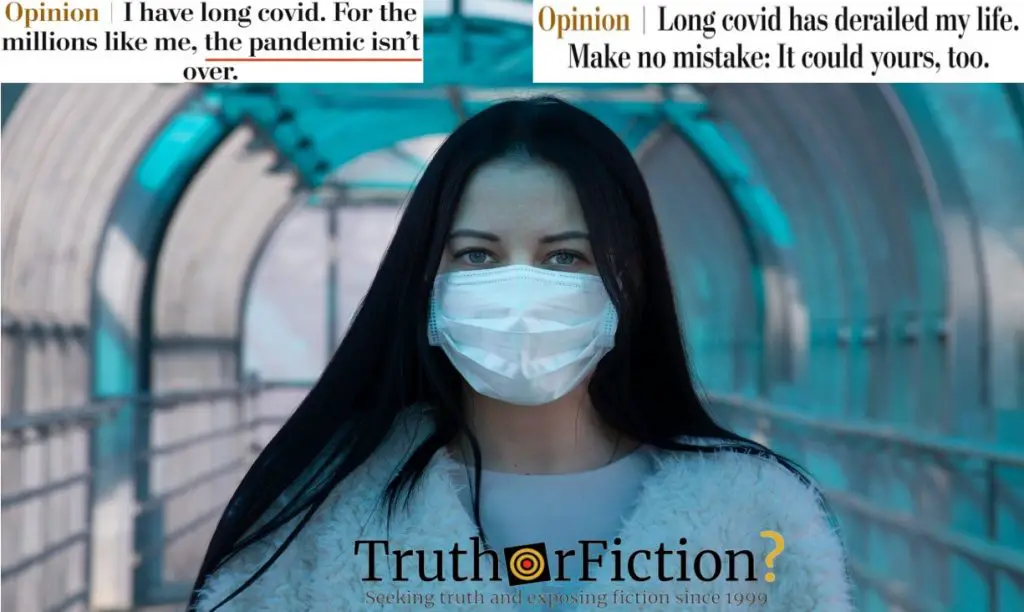Amid reports of a surge in the COVID-19 pandemic, the Washington Post altered the headline for an author’s op-ed describing living with the disease in which she said that for her and Americans living in similar situations — and contrary to the newspaper’s claims — the pandemic has not ended.
“I’ve watched in horror as our public institutions have turned their back on containment,” Madeline Miller wrote in her August 9 2023 op-ed. “The virus is still very much with us, but the Centers for Disease Control and Prevention has stopped reporting on cases. States have shut down testing. Corporations, rather than improving ventilation in their buildings, have pushed for shield laws indemnifying them against lawsuits.”
Fact Check
Claim: The Washington Post changed an author’s words which claimed the pandemic isn’t over
Description: The Washington Post altered the headline for an author’s op-ed describing living with COVID-19. Originally, the headline read, “I have long covid. For the millions like me, the pandemic isn’t over.” The headline was later changed.
When Miller first promoted the piece online, the headline read, “I have long covid. For the millions like me, the pandemic isn’t over.”
But as scientist and public advocate Dr. Lucky Tran later pointed out, the headline was changed to read “Long covid has derailed my life. Make no mistake: It could yours, too.”
“Like many on-line publications, we frequently test multiple headlines for the same piece of content to find the one that is most effective at connecting the content with readers,” Post Opinion Editor David Von Drehle told us regarding the change. “I don’t see that either of the tested headlines in your inquiry in any way contradicts the essay.”
Miller’s piece is part of a series of articles the Washington Post is running under the title, “Post Pandemic.” The newspaper’s explanation for the series also places the disease in the past tense:
We spent two to three years building private, interior covid worlds. Now, with the exterior world reopening, Post Opinions asked fiction and nonfiction writers, essayists and poets to reflect on what it’s like to be getting outside — if they are — and how the pandemic changed them.
But Miller’s story describes both the virus and the response from the federal government as an ongoing problem:
The virus is still very much with us, but the Centers for Disease Control and Prevention has stopped reporting on cases. States have shut down testing. Corporations, rather than improving ventilation in their buildings, have pushed for shield laws indemnifying them against lawsuits.
Despite the crystal-clear science on the damage COVID-19 does to our bodies, medical settings have dropped mask requirements, so patients now gamble their health to receive care. Those of us who are high-risk or immunocompromised, or who just don’t want to roll the dice on death and misery, have not only been left behind — we’re being actively mocked and pathologized.
As of July 29 2023, the Centers for Disease Control and Prevention (CDC) reported 9,056 hospitalizations around the U.S. per week — a 12.5 percent increase from the previous week. Critics of the government response to the disease also frequently cite the Walgreens retail chains COVID-19 tracker webpage, which showed a national positivity rate of 44.7 percent as of August 7 2023, a 3.4 percent increase over the previous week.
According to the National Institutes of Health, around 23 million Americans “may have symptoms” associated with Long COVID. A day after Miller’s op-ed was published, Associated Press reported that researchers are still grasping to understand the effects of the virus on patients’ cardiovascular health.
Los Angeles-based cardiologist Dr. Susan Cheng told the AP that in the first two years of the pandemic, heart attack deaths for people between 25 and 44 years of age increased by almost 30 percent; overall, she said, COVID-19 put a halt to a decade-long decline in heart-related deaths in the United States.
“We are seeing effects on the heart and the vascular system that really outnumber, unfortunately, effects on other organ systems,” said Cheng, who works at Cedars-Sinai Medical Center.
As we have previously reported, other major newspapers like the Philadelphia Inquirer and Boston Globe have published articles minimizing the virus. Von Drehle pointed to the decisions by the CDC and the World Health Organization (WHO) in May 2023 to end their respective public health emergency declarations regarding the virus.
On August 9 2023, the WHO announced that it had declared a new variant of the virus, EG.5, a “variant of interest” but that it did not pose “additional public health risks.” The latest variant reportedly accounts for more 17 percent of COVID-19 cases in the United States.

